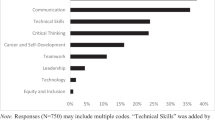Abstract
Social Science PhDs—Five+ Years Out (SS5) surveyed a national sample of recent doctorate recipients, including 164 geographers, to find out how well their PhD programs prepared them for their careers. The study was motivated in part by longstanding criticism of US PhD programs as “over-producing” PhDs and failing to equip graduates with skills needed in today’s labor market (Nerad 2004). It was also motivated in part by the need for student-centered evaluations of PhD programs (Ostriker and Kuh in Assessing research-doctorate programs: a methodology study. National Academies Press, Washington, 2003; Denecke in The assessment of doctoral education: emerging criteria and new models for improving outcomes. Stylus, Sterling, pp xi–xiii, 2006). This article presents findings about geographers, including career paths, skills used in their work, and evaluations of the quality of training in these skills received during graduate school.
Similar content being viewed by others
Notes
The Ford Foundation provided financial support.
Analysis not shown here revealed that respondents who rated a skill “very important” in their current job were only slightly more likely than others to rate their training in that skill “excellent.”
References
Babbit, V., Rudd, E., Morrison, E., Picciano, J., & Nerad, M. (2008). Careers of Geography PhDs: Findings from Social Science PhDs—Five+ Years Out. CIRGE Report 2008-02. (CIRGE: Seattle, WA). Available at www.cirge.washington.edu.
Bartelse, J., & Husiman, J. (2008). The Bologna process. In M. Nerad, & M. Heggelund (Eds.), Toward a global PhD? Forces and forms in doctoral education worldwide. (pp. 101–113). Seattle, WA: UW Press.
Denecke, D. D. (2006) Foreword. In P. L. Maki, & N. A. Borkowski (Eds.), The assessment of doctoral education: Emerging criteria and new models for improving outcomes (pp. xi–xiii). Sterling, Virginia: Stylus.
Enders, J. (2004). Research training and careers in transition: A European perspective on the many faces of the Ph.D. Studies in Continuing Education, 26(3), 419–429.
Gibbons, M., Limoges, C., Nowotney, H., Schwarzman, S., Scott, P., & Trow, M. (1994). The new production of knowledge: The dynamics of science and research in contemporary societies. London: Sage.
National Science Foundation (2000). Graduate education reform in Europe, Asia and the Americas and international mobility of scientists and engineers: Proceedings of an NSF workshop, NSF 00-318. Division of Science Resource Studies, Project Officer, Jean M. Johnson. Arlington, VA.
Nerad, M. (2004). The PhD in the US: Criticisms, Facts, and Remedies. Higher Education Policy, 17, 2.
Nerad, M. (2009). Confronting common assumptions: Designing future-oriented doctoral education. In R. Ehrenberg (Ed.), Doctoral education and the faculty of the future. Ithaca, NY: Cornell University Press.
Nerad, M., Rudd, E., Morrison, E., & Picciano, J. (2007). Social Science PhDs—Five+ Years Out: A National Survey of PhDs in six fields: Highlights report. Seattle, WA: CIRGE. www.cirge.washington.edu
Ostriker, J. P., & Kuh, C. (2003). Assessing research-doctorate programs: A methodology study. Washington, DC: National Academies Press.
Picciano, J., Rudd, E., Morrison, E., & Nerad, M. (2007). Social Science PhDs—Five+ Years Out: Survey methods. CIRGE report 2007-01. CIRGE: Seattle, WA. www.cirge.washington.edu.
Rudd, E., Nerad, M., Morrison, E. & Picciano, J. (2008). Professional development for PhD students: Do they really need it? CIRGE spotlight on doctoral education #2. CIRGE: Seattle, WA. www.cirge.washington.edu.
Schuster, J., & Finkelstein, M. J. (2006). The American Faculty: The restructuring of academic work and careers. Baltimore, MD: Johns Hopkins University Press.
Slaughter, S., & Rhoades, G. (2004). Academic capitalism and the new economy: Markets, states and higher education. Baltimore, MD: Johns Hopkins University Press.
Author information
Authors and Affiliations
Corresponding author
Rights and permissions
About this article
Cite this article
Rudd, E., Nerad, M. Career preparation in PHD programs: results of a national survey of early career geographers. GeoJournal 80, 181–186 (2015). https://doi.org/10.1007/s10708-014-9587-1
Published:
Issue Date:
DOI: https://doi.org/10.1007/s10708-014-9587-1



